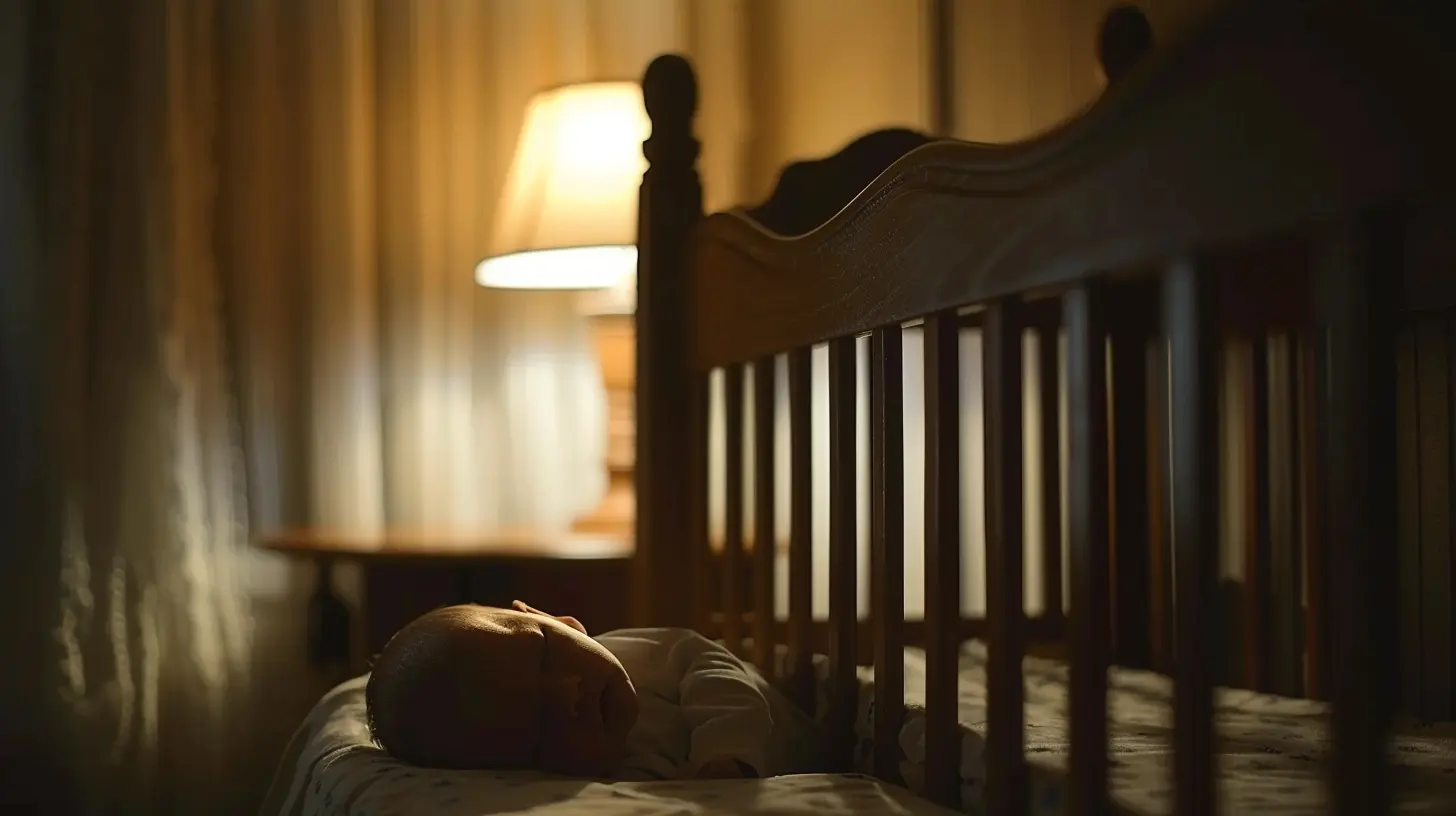When to Drop the Midnight Feed: Signs Your Baby Is Ready
7 October 2025
Ah, the midnight feed — a rite of passage for every new parent. You're snuggled up under the covers when that familiar cry pierces the quiet night. You shuffle blindly toward the crib, bottle or boob at the ready, just trying to survive until morning. Sound familiar?
Trust me, you're not alone.
Whether you’re breastfeeding, bottle-feeding, or doing a mix of both, those middle-of-the-night wakeups can feel never-ending. But here's the good news: They won’t last forever. There comes a time when your little one is actually ready to drop that midnight feed. The tricky part? Knowing when that time is.
Let’s talk about the signs that your baby is ready, what to expect when you start making that shift, and how to do it without turning your nights into a total train wreck.

Why Babies Wake Up for Midnight Feeds
Before we dive into the signs, let’s quickly understand why midnight feeds are even part of your baby’s schedule.Newborns have tiny stomachs. Like, ping-pong ball tiny. They can’t hold much at once, so they need to eat every few hours — day and night — to grow, gain weight, and stay hydrated.
But as your baby grows, especially past the three-month mark, their tummy expands, their sleep cycles begin to develop, and they start eating more during the day. That’s when night feeds may start to feel... well, optional.

So, When Can You Drop the Midnight Feed?
There’s no one-size-fits-all answer here — sorry! Every baby is different. But most healthy, full-term babies are physiologically capable of going without a feed for 6-8 hours straight somewhere between 4 to 6 months old.However, capability doesn’t always equal readiness.
Let’s break down the signs that your baby is actually ready to give up the midnight munch.
1. Your Baby Is Around 4–6 Months Old
This time frame is often when many babies start sleeping longer stretches at night without needing food. Why?By 4 months, your baby is usually past the cluster-feeding phase, weighs more, and can consume more calories during the day.
Some babies may still need a feed or two past 4 months, especially if they're going through a growth spurt or facing a sleep regression. But if your baby is closer to 6 months and still waking purely out of routine — or just cuddles — it might be time to reassess those nighttime snacks.
2. They’re Eating More During the Day
Here’s a big one. If your baby is having full feeds during the day (every 3-4 hours or so), and they’re getting the right amount of daily calories from daytime feeds alone — they might not need that extra feed at night.This is especially true if they’re starting solids (usually around the 6-month mark). Introducing a little puréed avocado or rice cereal can help them feel fuller longer, pushing the need for night feeds out of the picture.
Pro Tip? Try increasing daytime feedings gradually. A little extra milk or formula during the day can go a long way in helping your baby feel satisfied at night.
3. Your Pediatrician Gives the Green Light
Listen, we love advice from the internet (hi 👋), but when it comes to your baby’s diet, your pediatrician’s opinion should weigh the most.If your baby is gaining weight consistently, hitting milestones, and your doc says dropping the night feed is okay — that’s a strong thumbs up.
It’s always smart to rule out any underlying issues like reflux or low weight gain, which could mean your baby needs that extra feeding window.
4. They’re Waking but Not Actually Hungry
Here’s something to watch for: Is your baby waking up at 2 a.m. but only drinking an ounce or two before drifting off again? Hmm... sounds like a habit, not hunger.Try this little experiment: When they wake, comfort them without feeding — maybe with a gentle pat or a pacifier — and see what happens.
If they settle pretty quickly, they might not really need the feed.
Babies are creatures of habit. Just like us reaching for a snack when we’re not really hungry (hello, 10 p.m. chips), sometimes they wake out of routine, not need.
5. They’re Sleeping in Longer Stretches on Their Own
Has your baby ever slept 5-6 hours straight without waking? Maybe once, maybe a couple nights in a row?That’s a solid indicator that their body can actually handle longer periods without food.
Sometimes we’re the ones waking and assuming they need us — but if they're naturally able to stretch their sleep and wake up content, that’s a big clue.
6. Their Night Wakings Are All Over the Place
If your baby wakes at 1 a.m. one night, 3:30 a.m. the next, and then snoozes till 6 a.m. the following — you might be dealing with habitual waking that has little to do with hunger.Consistent hunger usually shows up around the same time every night. When the wakeups are random, it could mean they’re shifting sleep cycles, uncomfortable, or just testing the waters of independence.
7. You’re Ready (And Baby Feeds Are Affecting Sleep Quality)
Let’s be real — your mental health matters too.If your baby is waking for short, half-hearted night feeds but struggling to get back to sleep after? Or if you’re exhausted and it’s impacting your ability to function during the day? That’s a sign you might be ready for the next step.
A well-rested parent means a more peaceful home and a happier baby. Don’t overlook your own readiness here.
How to Drop the Midnight Feed Gently (And Without a Meltdown)
Okay, let’s say you’ve read the signs and you’re like, “Yep. We’re ready!” Now what?This isn’t a cold-turkey kind of gig. The goal is to make the transition smooth — for both of you.
1. Gradually Reduce the Amount
If you’re bottle-feeding, start by decreasing the amount in the bottle an ounce at a time every few nights. If you’re breastfeeding, reduce the time spent nursing at the midnight feed.Eventually, your baby may stop waking up for it altogether.
2. Shift More Calories to the Day
Try offering a bigger feed before bedtime and maybe even a “dream feed” around 10–11 p.m., when you’re still up. This can top them off and keep them snoozing longer.3. Soothe Without Feeding
When they wake up during the usual feed time, go in and soothe them — but skip the food. Rub their back, offer a pacifier, or just shush them calmly.This helps them learn that they can fall back asleep without a full belly.
4. Be Consistent
Here’s the hard part — you have to stick with it. Babies love routine, but they’ll test boundaries too. If you give in one night and feed them after three nights of weaning, you might end up back at square one.Hang in there. You’ve got this.
What to Expect During This Transition
Let’s be honest — this might not be smooth sailing. Your baby could resist, cry more than usual, or wake up multiple times during the night. But remember: change is hard for anyone, even tiny humans.Stick with your plan and expect things to level off in about 3-7 days.
Pay attention to how your baby is during the day too. If they’re happy, active, and eating well, chances are the night feeds were just a habit.
A Word on Sleep Training
Dropping night feeds often goes hand-in-hand with some form of sleep training. Whether you’re following the Ferber method, the chair method, or a no-cry approach — consistency is key.You don’t need to be rigid, but having a plan helps keep everyone on the same page (and a little more sane).
Trust Your Gut (You Know Your Baby Best)
Here’s the thing: no article, book, or advice column can know your baby better than you do.If your instincts say they're ready — trust that. Parenting is one big learning curve, filled with "am I doing this right?" moments. Dropping the midnight feed is just one bump on that twisty little road.
You got through labor, sleepless nights, and those terrifying first diaper blowouts. You’ll get through this too.
Final Thoughts
So when should you drop the midnight feed? In truth, it depends — on your baby’s age, health, sleep patterns, and your own sanity. But if your little one is healthy, eating well during the day, and waking more out of habit than hunger, it might be time.The path forward might not be fuss-free, but with a little patience, a lot of love, and maybe a good sound machine, you’ll both be snoozing through the night before you know it.
And when that day comes? Oh mama (or dad), it’s going to feel like graduating from Sleep Deprivation University.
Sweet dreams!
all images in this post were generated using AI tools
Category:
Baby SleepAuthor:

Maya Underwood
Discussion
rate this article
1 comments
Rhett McAdoo
Midnight munchies? Time for baby to embrace dreamland solo!
October 15, 2025 at 4:06 AM

Maya Underwood
Absolutely! If your baby shows signs of readiness, it's a great time to encourage independent sleep.


